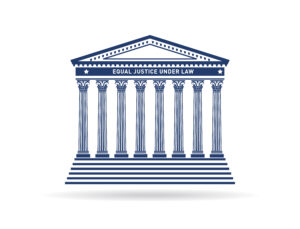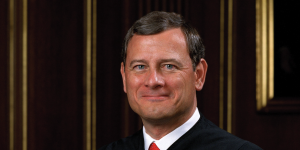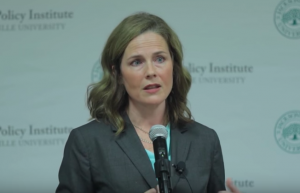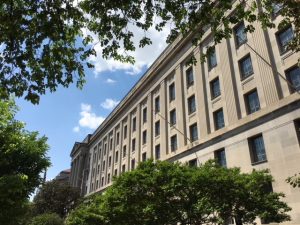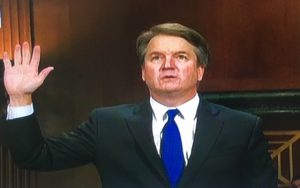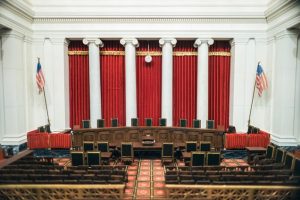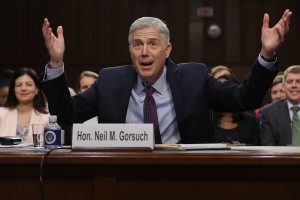Adam Feldman
-
Generating Predictions For Grants Pass v. Johnson Using Artificial Intelligence
Optimized Legal Audio is an artificial intelligence engine in its infancy that tries to hear what judges say, read the language they use, and through this to infer their relative preference for one attorney’s argument over another’s.
-
* Where does Justice Brett Kavanaugh fit along the ideological spectrum at the Supreme Court? Adam Feldman evaluates the evidence thus far. [Empirical SCOTUS]
* Speaking of SCOTUS, Frank Pasquale takes Neal Devins and Lawrence Baum’s new book, The Company They Keep: How Partisan Divisions Came to the Supreme Court (affiliate link), as a jumping-off point for exploring the political polarization of SCOTUS. [Balkinization]
* Texas v. Azar, the Obamacare case now pending before the Fifth Circuit, makes for unusual alliances — how often do you see Jonathan Adler, Nick Bagley, Abbe Gluck, and Ilya Somin on the same amicus brief? [Take Care]
* David Bernstein offers some thoughtful reflections — with which I happen to agree — on how some conservatives responded to the nominations of Neomi Rao and Jessie Liu. [Volokh Conspiracy / Reason]
* Joel Cohen has a question about Robert Mueller: “What did he know, and when did he know it?” [The Hill]
* And Cohen also has this interesting interview with Justice David Wecht of the Pennsylvania Supreme Court, about an important (and disturbing) subject: the recent rise in anti-Semitism, in America and abroad. [Tablet]
* If you share my interest in litigation finance, then you might be interested in this great new resource: a comprehensive digital library of documents relating to the litigation-funding industry. [Litigation Finance Journal]
* What trends and technology will shape the future of the legal profession? Jean O’Grady discusses highlights from a new report by Wolters Kluwer. [Dewey B Strategic]
-
-
* In the wake of Justice Anthony M. Kennedy’s retirement, I predicted that Chief Justice John Roberts, a staunch institutionalist when it comes to the Supreme Court, would serve as a moderating influence at SCOTUS — and so far that seems to be the case, with Adam Feldman noting a “a mild liberalizing over time” in JGR’s jurisprudence. [Empirical SCOTUS]
* Speaking of SCOTUS, it’s high time for the Court to resolve the messy circuit split on email privacy under the Stored Communications Act, according to Orin Kerr. [Volokh Conspiracy / Reason]
* The Trump Administration’s new executive order about free speech on university campuses might harm rather than help the cause of academic freedom, as Paul Horwitz points out. [PrawfsBlawg]
* Republicans aren’t the only ones with purity tests for judicial nominations; Demand Justice, a left-wing group focused on the federal judiciary, has high standards for Democratic opposition to Trump nominees. [Bench Memos / National Review]
* While you wait for the 2019 edition of Above the Law’s law school rankings, check out the latest installment of the “revealed preferences” law school rankings, by C.J. Ryan and Brian L. Frye. [SSRN]
* What’s next for Kira Systems, a leader in the world of legal AI? Co-founder and CEO Noah Waisberg isn’t resting on his laurels — and he’s putting that $50 million investment from last September to work. [Artificial Lawyer]
* Fastcase continues to forge new partnerships — and in its latest alliance, it will give its subscribers access to select titles from the American Bar Association (which, full disclosure, published my book (affiliate link) in 2014). [Dewey B Strategic]
* If you’ll be in New York this coming Wednesday, consider attending the inaugural Kenneth P. Thompson ’92 Lecture on Race and Criminal Justice Reform at NYU Law School, focused on wrongful convictions and the roles of prosecutors and others in the criminal justice system. [NYU Law]
-
* How have personnel changes at the Supreme Court affected the dynamics at oral argument? Adam Feldman offers this analysis. [Empirical SCOTUS]
* Ed Whelan expresses relief over the White House’s new slate of Ninth Circuit nominations. [Bench Memos / National Review]
* Can President Trump declare a “national emergency” in order to build his beloved wall? The National Emergencies Act is not a blank check, according to Brianne Gorod. [Take Care]
* Should Congress pass a “deepfakes” law? Orin Kerr has some concerns. [Volokh Conspiracy / Reason]
* What’s going on with Rudy Giuliani? Joel Cohen has a theory. [The Hill]
* Jean O’Grady is pleased to see all the competition in the legal analytics space (with Precedent Analytics from Thomson Reuters as the newest entrant) — but she’d like to see more support for the competing claims of the different products. [Dewey B Strategic]
* News organizations need stricter and better guidelines when interviewing mentally ill defendants, according to former public defender Stephen Cooper. [The Tennessean]
* Have questions about the fast-approaching February bar exam? Ashley Heidemann has answers. [JD Advising]
-
* Adam Feldman explores the possible effect on the Supreme Court of replacing Justice Ruth Bader Ginsburg with a staunch conservative — e.g., Judge Amy Coney Barrett. [Empirical SCOTUS]
* Speaking of SCOTUS, here’s Ilya Somin’s read of the tea leaves in Knick v. Township of Scott, an important Takings Clause case. [Volokh Conspiracy / Reason]
* Stephen Embry disagrees with Joe Patrice’s suggestion that junior lawyers are going extinct, but Embry acknowledges the major effect that technology is having, and will continue to have, on legal practice and employment. [TechLaw Crossroads]
* Charles Glasser looks at what might have caused the political polarization of the modern media and its consumers. [Daily Caller]
* The prospect of Michael Cohen testifying publicly before Congress is making some people giddy — but it’s not without its downsides, as Joel Cohen explains. [The Hill]
* What can we learn from official Washington utterances about the shutdown? Here’s some intel from VoxGov, via Jean O’Grady. [Dewey B Strategic]
* Not all provisions of the Bill of Rights are created equal, according to Gerard Magliocca. [PrawfsBlawg]
* David Berg draws lessons for trial lawyers from the genius of Joe Jamail’s use of hypothetical questions. [YouTube]
-
* In 2018, what did Donald Trump talk about when he talked about the courts? Adam Feldman dives into the data to find out. [Empirical SCOTUS]
* Speaking of President Trump and the judiciary, he continues to appoint federal judges at a record pace — but the Democrats are doing everything they can to slow down his progress. [Bench Memos / National Review]
* If you care at all about affordable housing, then you should be heartened by these developments in the fight against exclusionary zoning, as discussed by Ilya Somin. [Volokh Conspiracy / Reason]
* Congratulations to the Department of Justice on its ninth consecutive year of civil health care fraud settlements and judgments exceeding $2 billion. [MedCity News]
* If you’re interested in the hot topics among law librarians, legal technologists, and others in the space, check out Jean O’Grady’s most popular stories of 2018. [Dewey B Strategic]
* And if you’re interested in the year that was in artificial intelligence and the law, check out the Artificial Lawyer’s roundup of notable news. [Artificial Lawyer]
* Condolences to the friends, family, and colleagues of Bre Payton, who passed away last week at the age of 26. [The Federalist]
* Veteran trial lawyer David Berg continues his series on “What It Takes To Win.” [YouTube]
-
* Should you go to law school? Our very own Kathryn Rubino lays out the pros and cons. [Policydb8]
* You don’t have to practice law; here’s the story of how I went from practicing lawyer to founder of Above the Law, which I recently shared with Goli Kalkhoran. [Lessons From A Quitter]
* UVA Law graduate Johnathan Perkins — whose 3L controversy, covered in these pages (and elsewhere), turned out to be very different from initial reports — has recommendations for improving the school’s Honor System, especially when it comes to dealing with racial bias. [Cavalier Daily]
* Eugene Volokh and David Post offering conflicting perspectives on Brett Kavanaugh and judicial temperament. [Reason / Volokh Conspiracy; Reason / Volokh Conspiracy]
* The current Term of the U.S. Supreme Court might be short on blockbusters — but it’s not without interesting themes, according to Adam Feldman. [Empirical SCOTUS]
* Emily Gold Waldman explores the intersection of diversity requirements, inclusion riders, and Title VII. [PrawfsBlawg]
* Jean O’Grady looks at the latest offering from Intelligize. [Dewey B Strategic]
* Funding continues to flow into the world of legal tech — and the latest beneficiary is Lexoo, the U.K.-based, lawyer-matching online marketplace. [Artificial Lawyer]
-
* Many believe that today’s Supreme Court is one of the hottest benches in history; Adam Feldman uses data to assess the claim. [Empirical SCOTUS]
* As for who takes the SCOTUS bench, contingency plays a major role — along with credentials and conservatism, as Ian Millhiser explains. [ThinkProgress]
* Most people have their minds made up about Thursday’s Supreme Court confirmation hearings featuring Dr. Christine Blasey Ford and Judge Brett Kavanaugh — but if you’re still trying to process the proceedings, David Oscar Markus offers five simple rules for evaluating the witnesses. [The Hill]
* Ann Althouse has some reflections on Judge Kavanaugh’s emotional testimony and “present-day conservative masculinity.” [Althouse]
* David Bernstein proffers this interesting solution to the Kavanaugh nomination situation — but don’t hold your breath for its implementation. [Volokh Conspiracy / Reason]
* If the road to hell is paved with good intentions, “the EU is busy building a three-lane highway that leads to a particularly dark place,” according to Charles Glasser. [Daily Caller]
* Lawyer Luddites: “AI in the legal space is not scary,” as explained by David Kleiman of Bloomberg Law. [Artificial Lawyer]
* Indeed, as Greg Lambert argues, lawyers — especially “working partners” — need to join the innovation conversation. [3 Geeks and a Law Blog]
-
* It’s checkout time at the Supreme Court, and courtroom correspondent Mark Walsh is ready to reveal what’s in his shopping cart. [SCOTUSblog]
* Being cited by the Supreme Court is usually something to boast about — but not always, as Adam Feldman notes in this thoughtful analysis of how much oral arguments matter. [Empirical SCOTUS]
* Will Baude breaks down the Court’s intriguing debate over stare decisis in South Dakota v. Wayfair. [PrawfsBlawg]
* Joel Cohen looks at why the federal judiciary gets better treatment from the press than the other two branches of government — and whether the differential is justified. [The Hill]
* Orin Kerr identifies an interesting issue: if a police officer uses Google Translate to try and request consent to search from a non-English speaker in that person’s own language, is the consent valid if Google Translate botched the translation? [Volokh Conspiracy / Reason]
* There’s a long and bipartisan tradition of… the federal government spying on reporters, as Charles Glasser explains. [Daily Caller]
* Speaking of the media, Jean O’Grady points out a helpful new resource from CQ for consumers of news, along with tips for how to tell whether or not a story is “fake news.” [Dewey B Strategic]
* If reforms come to university boardrooms, let’s hope they include law schools as well. [ProfessorBainbridge via Instapundit]
* An interesting new use of voice-activated technology, courtesy of Wolters Kluwer: getting insights into federal tax law. [Artificial Lawyer]
* If you’ll be in New York on Tuesday, July 17, raise your glass with fellow young lawyers, summer associates, and law students, at the UJA’s Summer Law Happy Hour. [UJA Federation of New York]
-
-
* A question that has crossed the mind of every Biglaw corporate associate: “How much of lawyering is being a copy-and-paste monkey?” [3 Geeks and a Law Blog]
* Kenneth Jost notes out how Justices Ginsburg and Gorsuch like to butt heads — and scores the fight 2-0 in RBG’s favor. [Jost on Justice]
* And speaking of rumbles at One First Street, which pairs of justices have the most disagreements with each other, as reflected in majority and dissenting opinions? Adam Feldman has answers. [Empirical SCOTUS]
* Saira Rao, former Cleary Gottlieb associate and author of the clerkship novel Chambermaid (affiliate link), takes on a new challenge: running for Congress. [American Bazaar]
* Data privacy is the name of the game these days, and Thomson Reuters is ready; TR showed off its new, Watson-enabled Data Privacy Advisor at Legalweek here in New York. [Dewey B Strategic]
* Amidst all the hoopla and robot fights at Legalweek, it would be easy to overlook the latest news from Neota Logic — but you shouldn’t. [Artificial Lawyer]
* Should more states move away from requiring unanimous jury verdicts in criminal cases? Joel Cohen argues that 11 is not enough. [Law & Crime]
* Can a U.S. court punish someone for their speech, on the theory that he breached an agreement not to speak, while keeping the speech-restrictive agreement secret? Eugene Volokh thinks not (with good reason). [Volokh Conspiracy / Reason]
* Dewey see an end in sight for legal proceedings related to the collapse of the Biglaw giant? Former executive director Stephen DiCarmine was supposed to be in court today to face fraud claims from the Securities and Exchange Commission, but it looks like the parties might have a deal. [Law360]
* If you will be in New York City next weekend and are interested Asian-American leadership in the legal field, consider attending Columbia APALSA’s annual conference — where Kathy Hirata Chin will be honored for her efforts to promote diversity in the legal profession. [Columbia Law School APALSA]
-
* Very interesting piece by Mark Joseph Stern on Justice Neil M. Gorsuch’s dissent in Pavan v. Smith (aka the “LGBT parents on birth certificates” case). It seems to me that Justice Gorsuch’s statement is technically correct — the Arkansas Department of Health (1) was okay with giving the named plaintiffs their birth certificates and (2) conceded that in the artificial-insemination context, gay couples can’t be treated differently than straight couples (see the Arkansas Supreme Court opinion, footnote 1 and page 18) — but it’s either confusing, at best, or misleading and disingenuous, at worst (the view of Shannon Minter of the National Center for Lesbian Rights, counsel to the plaintiffs). [Slate]
* Speaking of Justice Gorsuch, Adam Feldman makes some predictions about what we can expect from him in the future, based on his first few opinions. [Empirical SCOTUS]
* Professor Rick Hasen has made up his mind on this: “Gorsuch is the new Scalia, just as Trump promised.” [Los Angeles Times]
* The VC welcomes a new co-conspirator: Professor Sai Prakash, a top scholar of constitutional law and executive power. [Volokh Conspiracy / Washington Post]
* Now that Harvard Law School will accept GRE scores in lieu of LSAT scores, what do law school applicants need to know about the two tests? [Law School HQ]
* And what do Snapchat users need to know about the app’s new “Snap Map” feature? Cyberspace lawyer Drew Rossow flags potential privacy problems. [WFAA]

